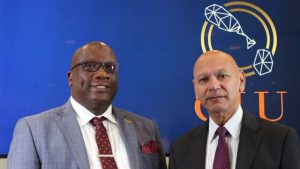
Prime Minister Dr Timothy Harris (L) with Citizenship by Investment Unit CEO Les Khan
In yet another press statement attempting to explain the rationale behind the introduction of a Hurricane Relief Fund (HRF) as a third investment option under the St Kitts and Nevis’ citizenship by investment (CBI) programme, the government has once again used misleading figures to disguise its new competitive advantage.
The controversy arose on September 22, just four days after Dominica, one of its regional competitors for CBI funds, was devastated by Hurricane Maria, when major changes to the federation’s CBI programme were announced, reducing by up to one half the amount of money applicants have to contribute for a passport.
Mahdi Mohammed, CEO of Guide Consultants, described the move by St Kitts as “truly shameful”.
“This is simply a ploy, a blatantly opportunistic move to improve the competitiveness of the St Kitts and Nevis CBI program at the expense of their Caribbean neighbours,” he said.
“Dominica has lost every source of government revenue except its CBI program and St Kitts and Nevis is attempting to undermine even that,” Mohammed said.
Antigua and Barbuda’s ambassador to the United States, Sir Ronald Sanders, described the action by St Kitts and Nevis as “a most unfortunate development. If it is implemented, it will hurt the relief and rebuilding efforts for Barbuda and Dominica, both of which were devastated. What is needed now is solidarity and joint action, not opportunism. It is to be sincerely hoped, that the decision will be reviewed and overturned in the interest of solidarity with neighbouring states that are truly struggling in the wake of these monstrous hurricanes and need every cent they can get.”
After conflicting statements by the government, including a message circulated to all Caribbean Community (CARICOM) ambassadors by the St Kitts and Nevis ambassador to the US, Thelma Phillip-Browne, to the effect that “You will see that it is a proportion of the contribution that is going to a special relief fund and not a drop in overall figure in order to undercut or compete as purported”, an assertion that was immediately contradicted by her own government, a press release on September 26 claimed that a proportion of the reduced contribution of US$150,000 will go to the fund.
The prime minister’s office has still not yet responded to a request for clarification as to this yet another “proportion”: How much is this “proportion” exactly? Where will the rest go?
Nevertheless, on Tuesday, Prime Minister Dr Timothy Harris claimed, “This price point is 50 percent higher – I repeat, 50 percent higher than the US$100,000 set by Dominica and St Lucia for their donation option.”
However, what Harris failed to mention that this comparison is for a single applicant, whereas according to one citizenship consultant the typical application – as many as 90 percent of such applications – is made by a family unit of four: husband, wife and two children.
The investment previously required by St Kitts and Nevis for such a family unit was US$300,000, compared to the corresponding requirement in Antigua and Barbuda and Dominica of US$200,000.
The new regulations promulgated on Monday by Harris as the minister responsible for the CBI programme make it quite clear that the non-refundable contribution for a single applicant or applicant with up to three dependents is now US$150,000, in other words a 50 percent reduction in the previous level that also now undercuts Antigua and Barbuda and Dominica by 25 percent.
In an earlier attempt at damage control, the government claimed last Saturday that the new hurricane fund is not, after all, designed to benefit St Kitts and Nevis exclusively but also “to provide additional support for disaster relief efforts in nearby islands which suffered far greater damage” – something that was conspicuous by its absence in the initial announcements.
